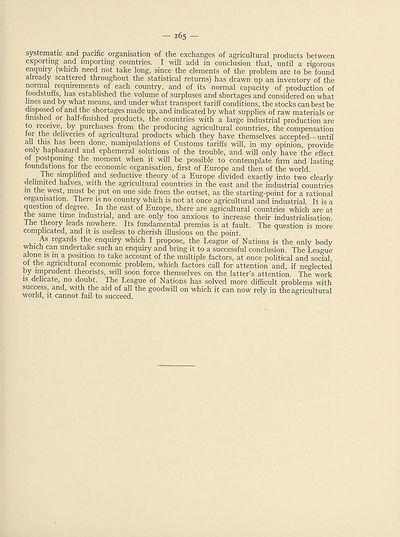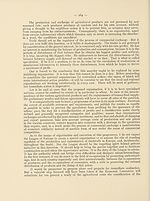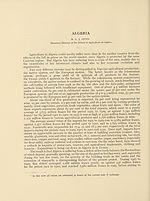Download files
Complete book:
Individual page:
Thumbnail gallery: Grid view | List view

— 165 —
systematic and pacific organisation of the exchanges of agricultural products between
exporting and importing countries. I will add in conclusion that, until a rigorous
enquiry (which need not take long, since the elements of the problem are to be found
already scattered throughout the statistical returns) has drawn up an inventory of the
normal requirements of each country, and of its normal capacity of production of
foodstuffs, has established the volume of surpluses and shortages and considered on what
lines and by what means, and under what transport tariff conditions, the stocks can best be
disposed of and the shortages made up, and indicated by what supplies of raw materials or
finished or half-finished products, the countries with a large industrial production are
to receive, by purchases from the producing agricultural countries, the compensation
for the deliveries of agricultural products which they have themselves accepted—until
all this has been done, manipulations of Customs tariffs will, in my opinion, provide
only haphazai d and ephemeral solutions of the trouble, and will only have the effect
of postponing the moment when it will be possible to contemplate firm and lasting
foundations for the economic organisation, first of Europe and then of the world.
The simplified and seductive theory of a Europe divided exactly into two clearly
delimited halves, with the agricultural countries in the east and the industrial countries
m the west, must be put on one side from the outset, as the starting-point for a rational
organisation. There is no country which is not at once agricultural and industrial. It is a
question of degree. In the east of Europe, there are agricultural countries which are at
the same time industrial, and are only too anxious to increase their industrialisation
Ihe theory leads nowhere. Its fundamental premiss is at fault. The question is more
complicated, and it is useless to cherish illusions on the point.
As regards the enquiry which I propose, the League of Nations is the only body
which can undertake such an enquiry and bring it to a successful conclusion. The League
alone is m a position to take account of the multiple factors, at once political and social
of the agricultural economic problem, which factors call for attention and, if neglected
by imprudent theorists, will soon force themselves on the latter’s attention. The work
is delicate, no doubt. The League of Nations has solved more difficult problems with
success, and, with the aid of all the goodwill on which it can now rely in the agricultural
world, it cannot fail to succeed.
systematic and pacific organisation of the exchanges of agricultural products between
exporting and importing countries. I will add in conclusion that, until a rigorous
enquiry (which need not take long, since the elements of the problem are to be found
already scattered throughout the statistical returns) has drawn up an inventory of the
normal requirements of each country, and of its normal capacity of production of
foodstuffs, has established the volume of surpluses and shortages and considered on what
lines and by what means, and under what transport tariff conditions, the stocks can best be
disposed of and the shortages made up, and indicated by what supplies of raw materials or
finished or half-finished products, the countries with a large industrial production are
to receive, by purchases from the producing agricultural countries, the compensation
for the deliveries of agricultural products which they have themselves accepted—until
all this has been done, manipulations of Customs tariffs will, in my opinion, provide
only haphazai d and ephemeral solutions of the trouble, and will only have the effect
of postponing the moment when it will be possible to contemplate firm and lasting
foundations for the economic organisation, first of Europe and then of the world.
The simplified and seductive theory of a Europe divided exactly into two clearly
delimited halves, with the agricultural countries in the east and the industrial countries
m the west, must be put on one side from the outset, as the starting-point for a rational
organisation. There is no country which is not at once agricultural and industrial. It is a
question of degree. In the east of Europe, there are agricultural countries which are at
the same time industrial, and are only too anxious to increase their industrialisation
Ihe theory leads nowhere. Its fundamental premiss is at fault. The question is more
complicated, and it is useless to cherish illusions on the point.
As regards the enquiry which I propose, the League of Nations is the only body
which can undertake such an enquiry and bring it to a successful conclusion. The League
alone is m a position to take account of the multiple factors, at once political and social
of the agricultural economic problem, which factors call for attention and, if neglected
by imprudent theorists, will soon force themselves on the latter’s attention. The work
is delicate, no doubt. The League of Nations has solved more difficult problems with
success, and, with the aid of all the goodwill on which it can now rely in the agricultural
world, it cannot fail to succeed.
Set display mode to:
![]() Universal Viewer |
Universal Viewer | ![]() Mirador |
Large image | Transcription
Mirador |
Large image | Transcription
Images and transcriptions on this page, including medium image downloads, may be used under the Creative Commons Attribution 4.0 International Licence unless otherwise stated. ![]()
| League of Nations > Economic and financial section > Agricultural crisis > Volume 1 > (167) |
|---|
| Permanent URL | https://digital.nls.uk/190904821 |
|---|
| Shelfmark | LN.II.2/2.(35) |
|---|---|
| Attribution and copyright: |
|
| Shelfmark | LN.II.2/2.(35-35) |
|---|---|
| Shelfmark | LN.II |
|---|
| Description | Over 1,200 documents from the non-political organs of the League of Nations that dealt with health, disarmament, economic and financial matters for the duration of the League (1919-1945). Also online are statistical bulletins, essential facts, and an overview of the League by the first Secretary General, Sir Eric Drummond. These items are part of the Official Publications collection at the National Library of Scotland. |
|---|---|
| Additional NLS resources: |
|

